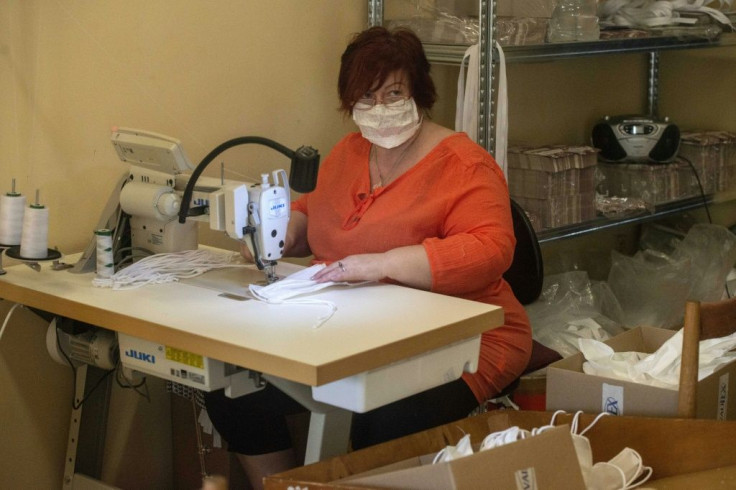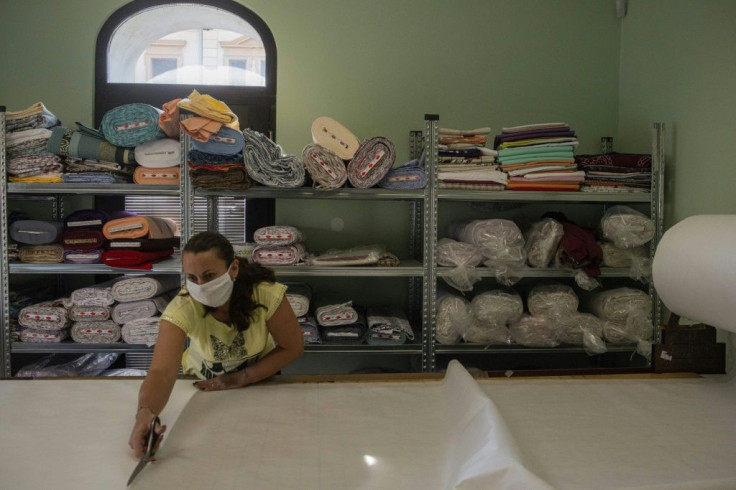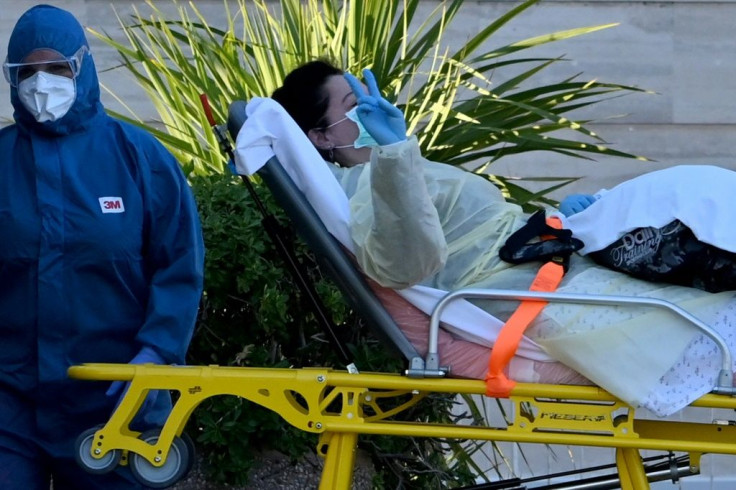Sewing Face Masks Goes Viral In Europe

What do prisoners, a former first lady and textile makers have in common? All have threaded their needles to combat a dire global shortage of face masks that risks the health of millions amid the COVID-19 pandemic.
Just a week ago, the small Czech company Nanospace was producing bed linen using nanomembrane -- a textile with a very fine web of nanofibres -- to protect allergic sleepers from mites.
But as the deadly novel coronavirus started reaping its grim toll in Europe, Nanospace workshops began churning out 10,000 nanomembrane face masks per day for two hospitals in the southern Czech Republic.
The company produced the first masks within two days of a desperate call from the local city hall on March 14.
"We charge them (the hospitals) at cost price. If the hospitals collapse due to a shortage of masks, our region will be in big trouble," Nanospace sales director Jiri Kus told AFP.
The World Health Organisation recommends wearing protective masks in public, despite some experts saying masks and gloves are ineffective in preventing coronavirus infections.
Tens of thousands of Europeans are joining forces via social media to sew masks as millions are confined to their homes under lockdown measures imposed to prevent COVID-19 infections.
A Czech Facebook group called "Czechia sews face masks" went viral, drawing over 33,000 members over the last week as Prague ordered citizens to wear masks outdoors and closed borders to stem the spread of the virus.
Artists and celebrities including actress Dagmar Havlova, the wife of late Czech president Vaclav Havel, have also pitched-in to make masks.
In neighbouring Poland, Chechen women who arrived as refugees have teamed up with women's groups to sew masks for hospitals.

Mask-making has also taken off in Italy, the worst-hit country in the world.
Deaths surged past 4,800 as of Saturday, with more than 53,000 confirmed infections.
Italian clothes and textiles-maker Miroglio has swapped sewing women's fashion for cotton face masks, rapidly ramping up production to 75,000 units per day with a view to hitting 100,000 soon, the La Stampa daily reported.
Businesses in hard-hit Spain are also making the switch.

Bag maker Disenos NT told AFP it was producing 70-80,000 face masks per day in its Andalusian factory, working "at 100 percent capacity, 24 hours, seven days a week."
The Galicia-based Inditex, the world's largest fashion group that owns Zara among other popular brands, is also looking to begin making face masks at some plants, joining smaller Spanish textile companies already at work.
Spain has recorded Europe's second-highest COVID-19 death toll, hitting 1,326 as of Saturday, with almost 25,000 confirmed cases.
Prisoners are also pitching in. Female inmates in the small EU Baltic state of Lithuania aim to turn out 10,000 face masks per week for use in prisons to safeguard officers, convicts and their lawyers, Lithuanian Justice Minister Elvinas Jankevicius told AFP.
Hungarian prisoners have made some 300,000 face masks for the country's health sector since February.
Dubbed "Europe's sweatshop" because of its many low-cost fast-fashion factories, Bulgaria has seen dozens of them switch to making masks as orders for clothes dry up amid the Europe-wide closure of non-essential shops, including clothing stores.
Costume-makers from the shuttered opera in the eastern Bulgarian city of Burgas have also volunteered to make masks, while Angel Baby, a firm producing sleeping bags for kids in the capital Sofia, is handing out masks decorated with owl, dinosaur, llama and monkey prints to doctors and the police.
A hospital in the western German city of Essen has taken mask-making into its own hands, with non-medical staff ranging from clerks to gardeners working from home to sew masks for patients.
German sports clothes maker Trigema and mattress-maker Breckle are among several companies also starting to make them.
Back in the Czech Republic, Nanospace sales director Jiri Kus is smiling as he scrambles for supplies and financing to expand mask production to the clack and rumble of the seven sewing machines in one of his workshops.
"I'm happy we've made it. At first I thought it was impossible, but when I saw the first hundred face masks on Monday, it just felt great."
"Now we have volunteers offering help -- they are sewing masks at home and although we can't use them, the solidarity and the enthusiasm are simply amazing."
© Copyright AFP 2024. All rights reserved.





















